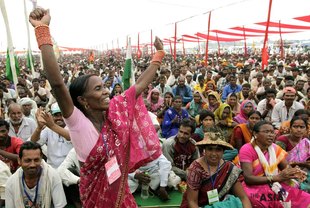Post-Corona politics, economics, social culture – What will change?

A teacher at a girls’ high school on South Korea’s southern Jeju Island demonstrates an online class on April 1, 2020, as the country will start the new school year in stages from April 9, beginning with online classes for middle and high school senior students. The opening of schools nationwide has been delayed four times due to COVID-19. (Yonhap)
By Peter Jaegeul Song,
Staff Reporter at Asia N
Seoul: The danger and threat of the COVID-19 virus, or coronavirus, is still ongoing. This is because the number of confirmed people in Korea has been on a steady rise, as well as the spread of virus-caused damage and risks in the United States, Europe and elsewhere in the world.
As Corona is a global phenomenon, it is widely expected that much will change even after the virus has passed our lives. This is not confined to medical issues. Corona will derive a new order, or “New Normal,” that we have never expected, across politics, economics and social culture. If we want to understand and prepare for the post-Corona political, economic and social cultures, we need to know more about them.
So, what changes will appear in post-Corona political, economic and social culture? First of all, we can guess about lifestyle changes. Just as many universities currently offer non-face-to-face lectures and companies encourage work from home, many expect the spread of communication through non-face contact in the future.
Social isolation can thus emerge as one of the social phenomena, and the lifestyle of pursuing loose forms of solidarity will also spread. These changes can also affect the nature of the community. This is because the collective culture will slowly be dissolved as the “hon” culture of drinking alone, eating alone and traveling alone expands.
But this can create another problem. Individuals who did not feel comfort and belonging due to the disbanded community culture can trust themselves with a new type of patriotism and patriotism. But there is also a positive change. It is because urban parks can be revived as healing spaces in the city, and it is certain that the culture of collective worship in religion will also change.
Also looking back on the political side, one can see the fundamental question of democracy itself. There are growing calls for the return of a large government capable of controlling and coordinating the situation, and trust in public services and public offices has also risen sharply. While there are conceptual changes taking place, real changes are also taking place. That’s the case with the vote. The voting format can also be converted to electronic voting format to allow less contact with people, and the election period will be extended accordingly.
Nor can we overlook the possibility of an economic crisis at this point, and there is a need to prepare for the resulting political uprisings. It is also estimated that the world economy will need a big government as the highest-ever economic crisis occurs.
First of all, regulations on the use of hoarding and other such practices are needed. As evidenced by the high-volume purchase of masks and the sale of them back to the market, some restrictions are necessary in the post-Corona situation. Thus, the prediction that neo-protectionism will emerge is dominant.
In addition, we can predict that the cutoff of communication with foreign countries will strengthen the domestic supply chain. The polarization, previously considered one of the economic problems, evolves into a new form after the virus. This is because in the platform economy, there will be huge polarization between those who work as workers and platform owners who have platforms.
There is also a crisis in the network between cities formed in the existing world. First of all, the spread of the virus causes tourism to stagnate, and the need for an essential safe distance between people and people leads to a decline in profitability per urban area. This soon results in a fall in rent.
But on the economic front, the most important topic is the financial crisis, and the real economic crisis. As the financial crisis and the real economy crisis take place simultaneously, corporate and household debts rise very much. Also, as consumer sentiment shrinks, the retail business is bound to stagnate. However, it is predicted that the platform business, which is represented by delivery applications, will generate more growth than now.
The unemployment rate is also set to rise sharply as the economic crisis hits. However, the number of unemployed will increase in the order of non-regular workers and regular workers, starting with part-time jobs, which are the most unstable workers, and public government support may be needed as the number of unemployed grows.
In post-Corona political, economic and social cultures, it is important that the collapse of existing developed countries is visible. The outbreak has forced Western European countries, including Italy and Spain, to re-examine their country’s collapsed medical systems. Also, Japan, once considered Asia’s biggest advanced country, has suffered a downfall due to poor judgment in the face of the Corona crisis, and the U.S. has also left numerous patients unattended due to incompetent responses. As can be seen from this, the concept of advanced countries as we know them is changing.
In addition, the disappearance of liquidity in the global world is raising fears of deepening regional crises and personal instability. The competition for survival in the region will worsen, and polarization will inevitably grow accordingly. Thus, in post-Coronavirus situations, we must pursue democracy more and more, and we must deepen the order of Korean-style democracy and break through the crisis by disclosing information transparently.




